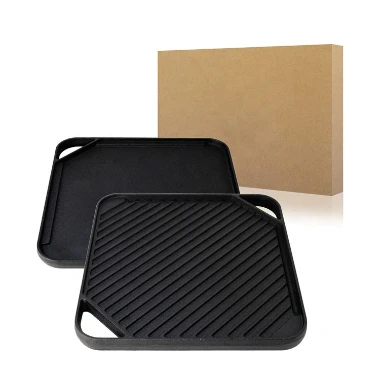
washing a cast iron skillet
Washing a Cast Iron Skillet Best Practices for Longevity
Cast iron skillets are beloved kitchen tools, cherished for their heat retention, durability, and ability to develop a natural non-stick surface over time. However, one of the most significant aspects of maintaining a cast iron skillet is proper washing and care. While it may seem straightforward, washing these skillets requires specific techniques to ensure their longevity and performance.
Why Cast Iron is Unique
Cast iron cookware has a unique surface that improves with use. Unlike non-stick pans, cast iron skillets develop a seasoning layer—a polymerized coating created from fats and oils that are baked onto the cookware. This seasoning gives cast iron its non-stick properties. Washing this type of cookware improperly can strip away the seasoning, leading to rust and food sticking, which is a nightmare for any home cook.
When to Wash Your Skillet
The first rule of thumb is to wash your cast iron skillet after each use. However, this does not mean treating it like regular cookware. Ideally, you should wash it as soon as it has cooled, but while it's still warm. Leftover food can be easily removed with a stiff brush or a non-metal scrub pad. Avoid soaking the skillet in water, as prolonged exposure to moisture may lead to rust.
Washing Techniques
washing a cast iron skillet

1. Scrubbing Use hot water and a stiff-bristled brush or sponge to remove any stuck-on food. Avoid using soap unless absolutely necessary, as it can break down the seasoning. If your skillet has stubborn bits, you can use coarse salt as a gentle abrasive. Sprinkle a tablespoon of salt over the surface and scrub with your brush, then rinse with warm water.
2. Drying Once clean, drying your skillet promptly is crucial. Place it on a low heat on the stove for a few minutes to evaporate any moisture completely. This step is essential to prevent rust.
3. Re-seasoning After drying, it’s a good practice to apply a thin layer of cooking oil (such as vegetable oil or flaxseed oil) to the surface while the skillet is still warm. This will help maintain the seasoning and protect the skillet from moisture.
Special Considerations
Avoid using metal scrubbers and dishwasher detergents, which can strip away the seasoning. If your skillet becomes rusted or loses its non-stick properties, it can be revived through a seasoning process—cleaning it thoroughly to remove rust, then applying oil and baking it in the oven to restore its protective layer.
Conclusion
Washing a cast iron skillet may require a bit more effort than washing other types of cookware, but the rewards are significant. With proper care, a cast iron skillet can last a lifetime, improving its cooking performance and flavor with each use. Remember to scrub, dry, and season your cookware carefully to maintain its rustic charm and usability. Embrace the unique characteristics of cast iron, and you will soon appreciate why it has been a staple in kitchens for centuries. Happy cooking!
-
Season Cast Iron Perfectly with GPT-4 Turbo TipsNewsAug.01,2025
-
High Quality Cast Iron Cookware - Baixiang County Zhongda MachineryNewsAug.01,2025
-
Premium Cast Iron Pan: Durable & Perfect HeatNewsAug.01,2025
-
High Quality Kitchen Durable Black Round Cast Iron Cookware Pancake Crepe Pan-Baixiang County Zhongda Machinery Manufacturing Co., Ltd.NewsAug.01,2025
-
Cast Iron Cookware - Baixiang County Zhongda Machinery | Nonstick, Heat ResistanceNewsAug.01,2025
-
High Quality Kitchen Durable Black Round Cast Iron Cookware - Baixiang County Zhongda Machinery | Non-Stick, Heat Retention, DurableNewsJul.31,2025


